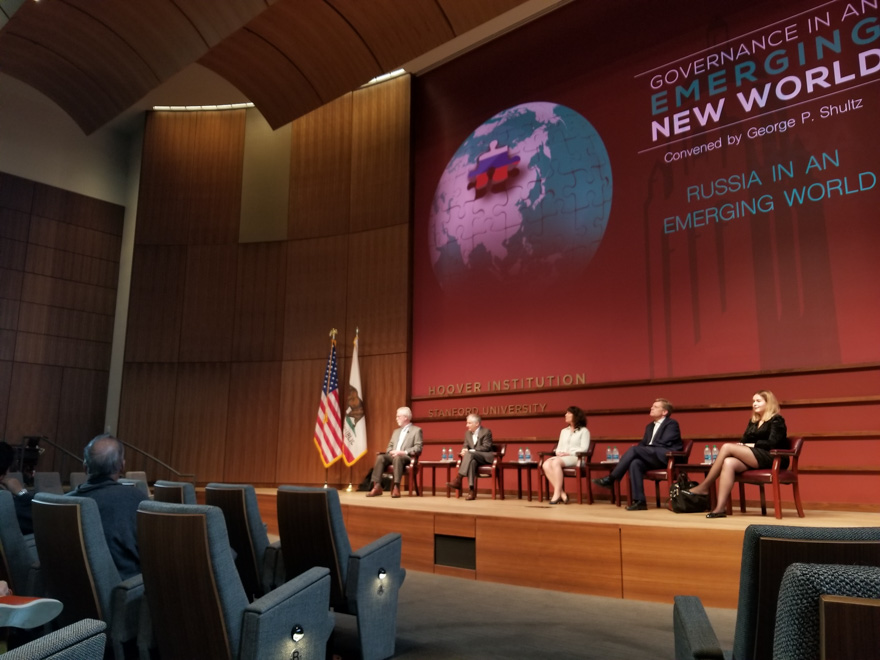“Governance in an Emerging New World,” an initiative by the Hoover Institution, launched on Wednesday with the aim of promoting discussion and thinking on the governance challenges posed by rapid demographic, technological and societal change around the globe. The first panel in the series, moderated by Deputy Director-General of the International Institute for Strategic Studies (IISS) Kori Schake, considered these issues with regard to Russia.
The initiative is organized by George P. Shultz, Distinguished Fellow at the Hoover Institution, who has previously served as the 60th Secretary of State and 62nd Secretary of the Treasury. The series will include roundtable conversations and public panels featuring speakers who have also authored scholarly essays that will accompany the discussions.
The series focuses on four 21st century challenges — shrinking workforces, rapid information and technology change, artificial intelligence and new means of manufacturing — and invites experts to discuss how these patterns might shape the world and disrupt traditional methods of governance.
“If you don’t understand these things, then you’re not gonna get the right answer,” said James Timbie Ph.D. ’71, a Visiting Fellow at Hoover involved in coordinating the series. “One of [Shultz’s] favorite phrases is ‘The future’s not going to be like the past,’ so we want to look into where things are going.”
Wednesday’s panelists included Chair of Cyber Issues at the Russian International Affairs Council Maria Smekalova, former US Ambassador to Russia and head of the Freeman Spogli Institute Michael McFaul, Princeton University professor and Hoover Fellow Stephen Kotkin and former Stanford professor and Hoover Fellow David Holloway.
Smekalova, speaking on the behalf of Russian Foreign Minister Igor Ivanov, began the discussion by addressing Russia’s place in a new world order — which is increasingly defined by rapid technology change — as it faces the demographic challenges of new migration patterns and an aging population. Smekalova also described the phenomena of “brain drain” currently affecting Russia, whereby many of Russia’s technologically-minded young people are moving out of the country.
“We do have a migration flow that comes into Russia,” Smekalova said. “But unfortunately… most of them are low-skilled workers who cannot substitute for professionals leaving to different countries.”
McFaul followed with comments on the potential for Russia to develop high tech industries, but also presented what he believed to be obstacles to technological progress and reasons for Russia’s underperformance: the “brain drain” phenomenon and a lack of capital.
“There is no Silicon Valley in Russia,” McFaul said. “But there should be.”
The talk, which was punctuated with a conversation on the importance of U.S.-Russian cooperation and nuclear security, set the tone for the rest of the series, the scope of which will also include international governance, nuclear proliferation and climate change. The series also aims to focus on developments that Shultz believes require long-term planning and strategy.
“I have six great grandchildren… you look at them and you think to yourself, ‘What kind of world are these kids going to inherit? And what can I do that can make it a little better?’ So that’s my motivating objective right now,” Shultz said.
He also emphasized that the global developments to be discussed in the series will affect everyone. One goal of the series is to encourage the Stanford community and others to learn more about such developments and the challenges they may pose to international governance.
“I hope we can encourage Stanford students to think about these topics throughout their education and their careers going forward and to feel that they can do something about it in a constructive way, because they can,” said David Fedor B.S. ’06 M.S. ’11.
“China In An Emerging World,” the second event in the Hoover series, will be held on Oct. 29 in the Hauck Auditorium of the Hoover Institution’s David & Joan Traitel Building.
Contact Karen Kurosawa at karen16 ‘at’ stanford.edu and Elena Shao at eshao98 ‘at’ stanford.edu.
